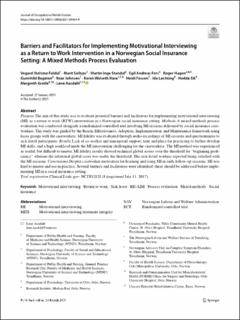| dc.contributor.author | Foldal, Vegard | |
| dc.contributor.author | Solbjør, Marit | |
| dc.contributor.author | Standal, Martin Inge | |
| dc.contributor.author | Fors, Egil Andreas | |
| dc.contributor.author | Hagen, Roger | |
| dc.contributor.author | Bagøien, Gunnhild | |
| dc.contributor.author | Johnsen, Roar | |
| dc.contributor.author | Hara, Karen Walseth | |
| dc.contributor.author | Fossen, Heidi | |
| dc.contributor.author | Løchting, Ida | |
| dc.contributor.author | Eik, Hedda | |
| dc.contributor.author | Grotle, Margreth | |
| dc.contributor.author | Aasdahl, Lene | |
| dc.date.accessioned | 2021-03-31T13:05:56Z | |
| dc.date.available | 2021-03-31T13:05:56Z | |
| dc.date.created | 2021-03-27T15:04:00Z | |
| dc.date.issued | 2021 | |
| dc.identifier.issn | 1053-0487 | |
| dc.identifier.uri | https://hdl.handle.net/11250/2736233 | |
| dc.description.abstract | Purpose The aim of this study was to evaluate potential barriers and facilitators for implementing motivational interviewing (MI) as a return to work (RTW) intervention in a Norwegian social insurance setting. Methods A mixed-methods process evaluation was conducted alongside a randomized controlled trial involving MI sessions delivered by social insurance caseworkers. The study was guided by the Reach, Efectiveness, Adoption, Implementation, and Maintenance framework using focus groups with the caseworkers. MI fdelity was evaluated through audio-recordings of MI sessions and questionnaires to sick-listed participants. Results Lack of co-worker and managerial support, time and place for practicing to further develop MI skills, and a high workload made the MI intervention challenging for the caseworkers. The MI method was experienced as useful, but difcult to master. MI fdelity results showed technical global scores over the threshold for “beginning profciency” whereas the relational global score was under the threshold. The sick-listed workers reported being satisfed with the MI sessions. Conclusions Despite caseworker motivation for learning and using MI in early follow-up sessions, MI was hard to master and use in practice. Several barriers and facilitators were identifed; these should be addressed before implementing MI in a social insurance setting. | en_US |
| dc.language.iso | eng | en_US |
| dc.publisher | Springer | en_US |
| dc.rights | Navngivelse 4.0 Internasjonal | * |
| dc.rights.uri | http://creativecommons.org/licenses/by/4.0/deed.no | * |
| dc.title | Barriers and Facilitators for Implementing Motivational Interviewing as a Return to Work Intervention in a Norwegian Social Insurance Setting: A Mixed Methods Process Evaluation | en_US |
| dc.type | Peer reviewed | en_US |
| dc.type | Journal article | en_US |
| dc.description.version | publishedVersion | en_US |
| dc.source.journal | Journal of occupational rehabilitation | en_US |
| dc.identifier.doi | https://doi.org/10.1007/s10926-021-09964-9 | |
| dc.identifier.cristin | 1901459 | |
| dc.description.localcode | This article is licensed under a Creative Commons Attribution 4.0 International License, which permits use, sharing, adaptation, distribution and reproduction in any medium or format, as long as you give appropriate credit to the original author(s) and the source, provide a link to the Creative Commons licence, and indicate if changes were made. The images or other third party material in this article are included in the article’s Creative Commons licence, unless indicated otherwise in a credit line to the material. If material is not included in the article’s Creative Commons licence and your intended use is not permitted by statutory regulation or exceeds the permitted use, you will need to obtain permission directly from the copyright holder. To view a copy of this licence, visit http://creativecommons.org/licenses/by/4.0/ | en_US |
| cristin.ispublished | true | |
| cristin.fulltext | original | |
| cristin.qualitycode | 1 | |

